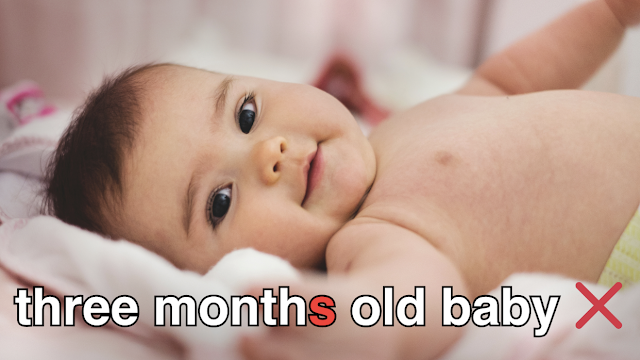不要在 「three months* old baby」中加入「-s」字尾!
我有兩個女兒 -- 一個已快三歲了,另一個則是6個月大。
我在香港也有很多同樣有小孩的朋友。
其中一位朋友最近在她兒子的一張可愛照片上標籤了#3monthsoldbaby*
這讓我想起,我經常見到學生在組成有「年齡」作形容詞的名詞組時,會犯一個容易避免的結構性錯誤:
three months old baby ❌
60 years old restaurant ❌
以上三個名詞組的結構性問題在於字尾「-s」,這個名詞眾數字尾不應該出現在這裡。
為什麼?
因為「-s」是個「名詞字尾」,而儘管「month」和「year」原本是名詞,但在這裡卻並非扮演名詞角色。
在這名詞組中,「核心名詞」(那「實際」在扮演名詞角色的字)是「baby」和「restaurant」。(嘗試用中文來思考這些名詞組:「三個月的BB」/ 「60年的餐廳」)
名詞組「three months old」和「60 years old*」雖然都包含了「month」和「year」,實際卻是在扮演著修飾「baby」和「restaurant」的形容詞角色。
由於「month」和「year」在這裡並不是名詞的角色,便不能在後面加入眾數字尾「-s」。
正確去組合這些名詞組的方法是:
three-month-old baby ✔︎
60-year-old restaurant ✔︎
重點是,「month」和「year」後面不可以加字尾「-s」,因為在這些名詞組中它們都不是名詞。
我們在書寫時也有標點符號的用法習慣,會在「three-month-old」和「60-year-old」中加入「hyphen」,以顯示它們一同是修飾後面名詞組的形容詞組。
這邏輯套會應用於所有這種名詞組(即其核心名詞被另一個名詞修飾)-- 因為語言是有系統的!
例如:
steak house (steaks house ❌)
car salesman (cars salesman ❌)
hotel chain (hotels chain ❌)
我們不能在「steak」、「car」和「hotel」後加眾數字尾「-s」,因為這些原本是名詞的單字,在這些名詞組中扮演的是核心名詞「house」、「salesman」和「chain」的形容詞。
下次記得要好好注意了!
小練習:
請更正以下兩個句子中,名詞組中的錯誤。
We went to a five stars hotel for dinner last night.
There will be a parents teachers conference at my son’s school next Wednesday.
____________________
(English version)
Don’t add an “-s” ending to “three months* old baby”!
I have two daughters -- one of them is almost three, and the other is 6 months.
I have many friends from Hong Kong who also have young children.
One of them recently added the hashtag #3monthsoldbaby* to a cute picture of her son.
This reminded me of a structural mistake that I see all the time regarding noun phrases with an adjective about “age”:
three months old baby ❌
60 years old restaurant ❌
The structural problem with these noun phrases is that the ending “-s” -- the plural noun ending in English grammar -- should not be there.
Why?
Because the “-s” is a “noun” ending, but the words “month” and “year” -- despite being nouns originally -- are not actually playing the role of nouns here.
In these noun phrases, the words that are the “core nouns” (the “actual” nouns) are “baby” and “restaurant.” (Try thinking of these noun phrases in Chinese -- “三個月的BB" / "60年的餐廳")
The phrases “three months old*” and “60 years old*” -- even though they contain the words "month " and"year " -- are playing the role of adjectives modifying “baby” and “restaurant” in these noun phrases.
Since the words “month” and “year” are not playing the role of nouns here, we cannot add the plural noun ending “-s” to them.
The correct way of forming these noun phrases is:
three-month-old baby ✔︎
60-year-old restaurant ✔︎
The main point is that there cannot be the “-s” ending in “month” and “year” because these words are not the “nouns” in these noun phrases.
In writing, there is also the punctuation convention of adding hyphens in “three-month-old” and “60-year-old” to indicate that they are adjective phrases modifying the core noun after them.
This logic applies to all noun phrases in which the core noun is modified by another noun playing the role of an adjective -- because language is systematic!
For example:
steak house (steaks house ❌)
car salesman (cars salesman ❌)
hotel chain (hotels chain ❌)
We cannot put the plural noun ending “-s” to the words “steak,” “car,” and “computer” here because these words -- originally nouns -- are playing the role of adjectives to the core nouns “house,” “salesman,” and “shop” in these noun phrases.
Try to watch out for this next time!
Mini Exercise:
Correct the mistake in the noun phrases in these two sentences.
We went to a five stars hotel for dinner last night.
There will be a parents teachers conference at my son’s school next Wednesday.
Answer:
We went to a five-star hotel for dinner last night.
There will be a parent-teacher conference at my son’s school next Wednesday.







Comments
Post a Comment